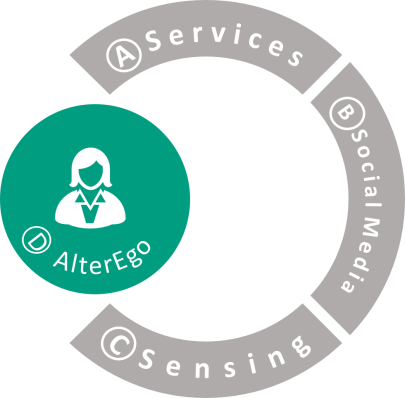The Doctoral College aims to enable mobile users to assess the trustworthiness of their 'digital counterparts' and to establish their interests regarding privacy protection. Hence, in Research Area D, a comprehensive system concept is developed that is trustworthy enough to represent the user in the digital network. Such a digital representative, in the following called AlterEgo is not only able to represent the user but also to establish the user's interest in terms of trust assessment and privacy protection. It will be the interface from the user to the Internet and vice versa. Therefore, usability research is a central component in D.1, as AlterEgo has to be easy to use concerning privacy and trust needs. Among others, mental models and risk communication are most important in project phase 1.
AlterEgo can only be successful when its trustworthiness can actually be verified by other 'digital counterparts' in the same way as with regular means such as identifications, certificates, and authorities. How this can be achieved is the research question in subarea D.2.
AlterEgo either assesses its digital counterparts concerning trustworthiness and privacy protection (where the user is informed about and able to control both objectives) or – in the name of the user – has to provide required evidence to its digital counterpart. On the one hand, this strongly depends on how much of his data the user likes to reveal and, on the other hand, on how much the digital counterpart needs for issuing the respective services. However, the user has to be able to clearly define required or granted evidence, levels of trust but also strategies for cooperation. General policies will allow everyday business to be transferred from the user to AlterEgo (i.e., 'consent management').
The challenge of D.4 is to achieve an overall conception for a trustworthy AlterEgo starting already with the hard- and software specification. Even if this step is conducted under governmental surveillance, it is a very critical one. Additionally, at runtime, it is necessary that the device can receive and integrate data and new functions (such as updates and extensions) while still staying trustworthy.






